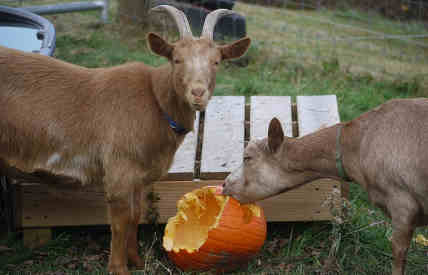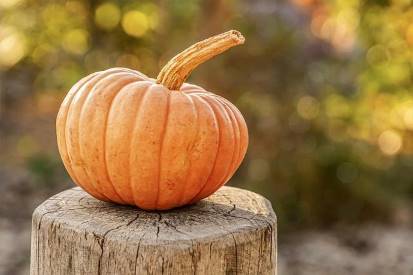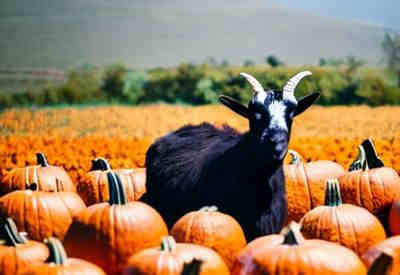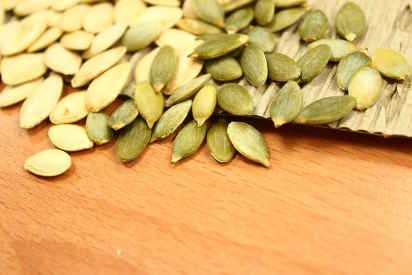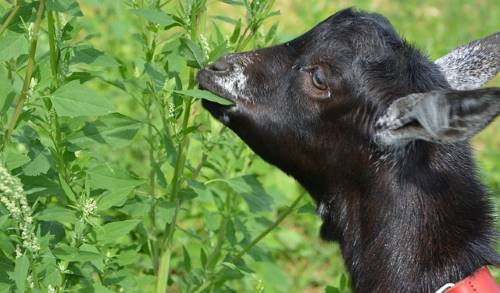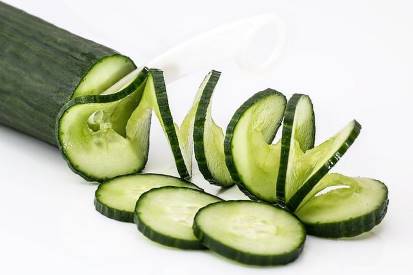It’s a question on many goat owners’ minds during autumn: can goats eat pumpkin? The simple answer is yes. Pumpkins are not just safe for goat consumption but also provide a host of nutritional benefits, making them an excellent addition to your goats’ diet.
Pumpkins are high in fiber and packed with essential vitamins and minerals, contributing positively to your goats’ health. From the pulpy flesh to the crunchy seeds, every part of the pumpkin can be a nutritious snack, making your autumn harvest doubly purposeful.
This article explores the specifics of incorporating pumpkins into your goats’ diet. We’ll cover the nutritional benefits, discuss how to safely prepare and serve pumpkins, and emphasize important precautions to avoid dietary issues. As we navigate through autumn, let’s ensure our goats get the chance to relish this seasonal treat, contributing positively to their balanced diet.
The benefits of eating pumpkin for goats
Just like humans enjoy pumpkins in pies and lattes this time of year, goats love them too. Here are a few reasons why you should be feeding your goat pumpkin.
Pumpkins are a good source of fiber
Goats need a lot of fiber to keep their digestive system running smoothly. Pumpkins are a great source of soluble and insoluble fiber, which can help with everything from diarrhea to constipation.
Pumpkins are a good source of vitamins and minerals
Pumpkin is packed with vitamins and minerals like vitamin A, vitamin C, potassium, and magnesium. All these are important for goats’ overall health, but vitamin A is especially important for maintaining healthy eyesight.
Pumpkins can help with weight gain
If your goat looks a little skinny, pumpkin can help them pack on the pounds. The high levels of vitamins and minerals found in pumpkins help promote growth and development, making them the perfect food for underweight kids or adults.
Pumpkins contain antioxidants
Pumpkins are loaded with antioxidants like beta-carotene and vitamins C and E, which help protect cells from damage caused by free radicals. These nutrients also support a strong immune system, which is especially important during the colder months when goats are more susceptible to illness.
Pumpkins are just plain fun
Let’s face it – pumpkins are fun! Goats love to play with them, nibble on them, and generally have a good time with them. So if you’re looking for a way to enrich your goats’ lives and give them some fun, giving them pumpkins is a great way to do it.
[GoatAffiliate]
Things to watch out for when feeding pumpkin to goats
Pumpkin is a popular food for goats, especially during the fall season. However, there are a few things that you need to watch out for when feeding goats pumpkin. Here are three of the most important things to keep in mind.
Pumpkins can cause diarrhea in goats
One of the most common side effects of feeding pumpkins to goats is diarrhea. This is because pumpkins are high in fiber and water content, which can cause digestive upset in goats.
If your goat has diarrhea, reduce the amount of pumpkin you feed them and see if their stools firm up. If not, consult your veterinarian.
Don’t feed moldy pumpkins
Moldy pumpkins can also be dangerous for goats. Moldy pumpkins can contain mycotoxins, which can be poisonous to livestock. If you think your goat has eaten a moldy pumpkin, watch for symptoms like vomiting, abdominal pain, tremors, and seizures, and call your veterinarian immediately.
Pumpkins can attract insects
Pumpkins can also attract insects, which can be dangerous for goats. Insects like bees and wasps can sting goats, and beetles can bite them. To avoid attracting insects, keep your pumpkins clean and free of debris.
How often should goats eat pumpkin?
While pumpkins are a safe and healthy treat for goats, eating too much can lead to digestive problems. Pumpkins are high in fiber, which can cause bloating and gas. They also contain sugar and other carbohydrates that can upset the delicate balance of a goat’s rumen, the large fermentation chamber in their stomach where food is broken down.
For these reasons, it’s best to offer pumpkins as an occasional treat rather than a regular part of their diet.
How to prepare pumpkins for feeding to goats
Before you start feeding pumpkins to your goats, there are a few things you need to know. Now we’ll give you a step-by-step guide on how to prepare pumpkins for your goats.
Cut the pumpkin in half
Cut the pumpkin in half from the stem to the base using a sharp knife. If your pumpkin is too large to cut in half, you can cut it into quarters.
Scoop out the seeds and pulp
Scoop out the seeds and pulp inside the pumpkin halves using a spoon. You can save the seeds to roast later if you’d like!
Cut the pumpkin into pieces
Once the seeds and pulp are removed, cut the pumpkin halves or quarters into smaller pieces that will fit easily into your goats’ mouths.
Serve and enjoy
Your goats will love munching on fresh pumpkin pieces. You can store any leftovers in the fridge for up to 3 days.
Can goats eat pumpkin rind?
Goat owners often wonder if their goats can eat pumpkin rind. The answer is yes, but it is important to cook the rind first to soften it. Cooking also helps to release the nutrients which are otherwise difficult for goats to digest.
So, if you’re looking for a healthy treat for your goats, consider adding some cooked pumpkin rind to their diet.
Can goats eat pumpkin seeds?
Pumpkin seeds are a great source of nutrients for goats and are generally considered safe to consume. Pumpkin seeds are a good source of protein, fat, and fiber, and they also contain important vitamins and minerals such as zinc and iron.
While most goats will happily snack on pumpkin seeds, it’s important to moderate their intake to avoid digestive issues. As with any new food, it’s best to introduce pumpkin seeds slowly into your goat’s diet and closely monitor their reaction.
When fed in moderation, however, pumpkin seeds can be a healthy and delicious treat for your goat.
Can your goat eat canned pumpkin?
Canned pumpkin is an excellent source of nutrients for goats, and it can help to improve their digestive health. However, choosing a canned pumpkin that is safe for goats to eat is important. Look for a product made with no added sugar or salt, and ensure that the pumpkin is pureed or minced.
While most goats will enjoy eating canned pumpkins, it is always best to introduce new foods slowly to avoid stomach upset. Give your goat a small amount of pumpkin at first, and then gradually increase the amount over time.
With a little bit of care, you can safely provide your goat with this delicious and nutritious treat.
Can baby goats eat pumpkin?
Baby goats are notoriously picky eaters, so it’s important to ensure they get all the nutrients they need to stay healthy. Pumpkin can be a great addition to their diet, as it’s full of essential vitamins and minerals.
However, it’s important not to give them too much pumpkin, as this can cause stomach upset. When feeding baby goats pumpkin for the first time, start with a small amount and gradually increase it each day until they eat a normal portion.
This will help them adjust to the new food and avoid digestive issues.
Can you feed your goat moldy or rotten pumpkin?
If you’re anything like me, you end up with many old, moldy pumpkins every year. And while you may not be able to use them for jack-o-lanterns anymore, you may wonder if your goats can still enjoy them.
Unfortunately, the answer is no. Moldy pumpkins are unsafe for goats and can even make them ill. The mold that grows on pumpkins produces toxins that can cause goats digestive problems and respiratory issues.
So if you’ve got some old pumpkins lying around, throwing them in the trash is best. Your goats will thank you for it.
What other vegetables can goats eat?
Apart from pumpkins, goats can enjoy a variety of vegetables as part of a well-balanced diet. These nutritious treats not only provide necessary nutrients but also help to add variety to their meals. Some favorite vegetables among goats include tomatoes, cucumbers, zucchini, squash, and bell peppers. Let’s look into the benefits of each of these vegetables for goats.
Tomatoes
Yes, goats can indeed eat tomatoes. These are packed with vitamin C, potassium, folate, and vitamin K, all beneficial to goats. However, remember to remove the green parts, such as the leaves and stem, as they contain solanine, a compound harmful to goats.
Read More: Can Goats Eat Tomatoes? 5 Benefits & A Warning
Cucumbers
Goats can safely consume cucumbers. Considering their high water content, they are a hydrating food source and can provide a refreshing treat, especially during hot weather. Cucumbers also contain several vitamins and minerals essential for a goat’s health. Always serve cucumbers fresh and washed to remove any possible pesticides.
Read More: Can Goats Eat Cucumbers? 5 Important Benefits
Zucchini
Zucchini is another great vegetable for goats. It’s a good source of fiber, vitamins A, C, and K, potassium, magnesium, and antioxidants. Due to its soft texture, it’s easy for goats to chew and digest. However, just like any other food, it should be given in moderation.
Read More: Can Goats Eat Zucchini? Simple Answer & Feeding Tips
Squash
Squash is not only safe but also beneficial for goats. It’s packed with vitamins A and C, potassium, and magnesium. Both summer and winter squashes can be given to goats, who usually love the taste. Don’t forget to remove the seeds before feeding squash to your goats.
Read More: Can Goats Eat Squash? Simple Answer & Feeding Tips
Bell Peppers
Bell peppers, regardless of color, are safe and healthy for goats. They’re rich in vitamins A and C and contain a fair amount of fiber. Most goats find them tasty, making bell peppers an ideal snack. Always remove the seeds and the stem before serving, and wash thoroughly to remove any chemical residues.
Read More: Can Goats Eat Bell Peppers? 5 Fantastic Benefits
Can goats eat pumpkin – final thoughts
Pumpkins are not just for jack-o-lanterns and pies; goats love them too! Pumpkin is a great source of nutrition for goats and can help with everything from their vision to their immune system.
That said, giving pumpkins to goats in moderation is important, as too much can cause digestive issues. So this autumn, when you’re carving pumpkins with the kids, save a few slices for your furry friends.
Related Articles:

